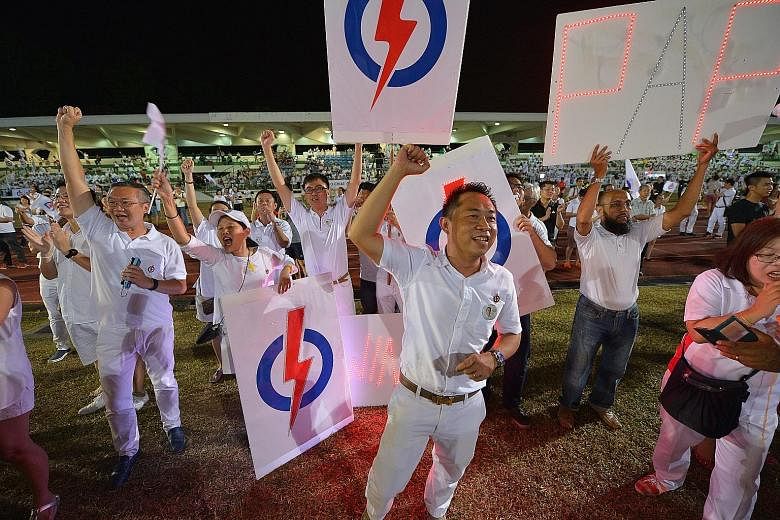Far from proving a continuation of 2011's downward trend for the ruling party, the numbers for the 2015 General Election recall 2001 instead - and not just because of the Sept 11 connection.
For a start, the People's Action Party's (PAP) 69.86 per cent share of the national vote is the highest since the 2001 elections.
That was when then Prime Minister Goh Chok Tong saw his party take 75.3 per cent, amid a national and global climate of uncertainty.
The 9.72 percentage point swing towards the PAP is also the party's first gain since 2001 - and just shy of its 10.3 percentage point gain then.
Similarly, the PAP's sky-high margins in its best-performing group representation constituencies this year were last seen in 2001.
Deputy Prime Minister Tharman Shanmugaratnam's Jurong GRC team were the best performers in this election - marking the first time ever that the PAP's highest vote share was clinched in a GRC.
Mr Tharman's five-member team took 79.28 per cent of the vote against a team fielded by new opposition party SingFirst.
The last comparable performances were in 2001, when the PAP team in Jurong GRC - which included Mr Tharman, in his maiden elections - took 79.75 per cent of the vote against a Singapore Democratic Party (SDP) team.
That year, the PAP also took 79.74 per cent in the now-defunct Hong Kah GRC, and did even better in several single seats.
The PAP's stellar 2001 performance is generally attributed to a "flight to safety" on the part of voters, amid economic doldrums and global insecurity following the Sept 11 terror attacks in the US.
Political observers said 2015's result is likely to arise partly from more positive sentiments.
Many pointed to policy improvements made since 2011 in areas such as transport and housing.
The national outpouring of emotions upon the death of founding Prime Minister Lee Kuan Yew in March as well as the jubilation surrounding Singapore's jubilee are also seen to have contributed.
Nonetheless, a "flight to safety" may have occurred this time as well.
Said National University of Singapore sociologist Tan Ern Ser: " I think voters still want a PAP government given that the external environment is quite hazardous."
Voters may have been exercising caution in another sense, he added: "Perhaps, voters were concerned about causing a freak election too."
During the campaign, the PAP had often brought up the spectre of a freak result in which voters could end up handing over more seats to the opposition than they intended.
Observers, politicians and voters alike had also been prepared for much closer fights. That "sense of foreboding" might have driven swing voters towards PAP, said Singapore Management University associate professor of law Eugene Tan.
The needle also swung back for the opposition parties, whose gains from the 2011 elections were largely wiped out. The opposition front runner, the Workers' Party, took 39.75 per cent of the valid votes across the 28 seats that it contested.
This was 6.83 percentage points down from its record high of 46.6 per cent in 2011, though still higher than the WP's previous outings.
"Looking at the national swing, WP has done pretty well in Aljunied in limiting that swing," said former Nominated MP Siew Kum Hong.
In contrast, with veteran opposition leader Chiam See Tong not contesting this election, the Singapore People's Party saw its vote share plummet by 14.34 percentage points. It took 27.08 per cent of the valid votes in seats contested.
The Singapore Democratic Party (SDP) did not fare as badly. Though it did not match its 2011 vote share of 36.8 per cent, it suffered a relatively smaller swing of 5.53 percentage points. SDP's 31.23 per cent share of the valid votes in seats contested makes it the second-best performing opposition party.
"In the context of the national swing, it's pretty creditable. It speaks of Dr Chee and Dr Tambyah's performance," said Mr Siew, referring to party leader Chee Soon Juan and his teammate in Holland-Bukit Timah GRC, Dr Paul Tambyah.


